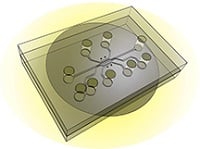 |
| Researchers have created a chip that mimics the microenvironment of a tumor.--Courtesy of Purdue University |
Conventional drug testing methods for cancer drugs are often unreliable. In vitro studies don't replicate the complex microenvironment surrounding tumors accurately, and oftentimes, animal research doesn't accurately show how therapies might work in people.
But a new chip designed to simulate a tumor may provide a new avenue of drug testing for researchers.
Designed by scientists at Purdue University, this tumor-microenvironment-on-chip (T-MOC) will be used to test experimental targeted cancer drugs as well as nanoparticles to selectively attack tumor tissue.
Measuring about 4.5 square centimeters (1.8 inches), the T-MOC chip contains microfluidic channels, which contain tumor cells and endothelial cells, the cells that line the inside of healthy blood vessels. The chip also has an extracellular matrix--a spongy, scaffold-like material made of collagen found between cells in living tissue.
One of the major barriers to studying nanoparticles for cancer treatment is the "interstitial fluid" inside tumors, which is greater than that of surrounding healthy tissue. This fluid hinders nanoparticles from reaching the tumor by pushing the drug-delivery agents out.
But the T-MOC system appears to correctly mimic this fluid, allowing researchers to study new drug-delivery techniques.
The details of the chip will be published in a study appearing in the Journal of Controlled Release in November.
- get the abstract and more from Purdue
Special Report: Biochips, bioprinting offer alternative drug testing options